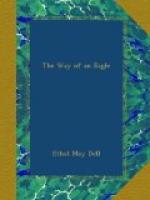The telegraph wires were cut, and for a time it seemed that all communication with the outside world was an impossibility. Several runners were sent out, but failed to break through the besieging forces. But at last after many desperate days there came a message from without—a scrap of paper attached to a stone and flung over the wall of the fort at night. News of the disaster had reached Peshawur, and Sir Reginald Bassett, with a hastily collected force, was moving to their assistance.
The news put heart into the garrison, and for a time it seemed that the worst would be averted. But it became gradually evident to General Roscoe that the relieving force could not reach them in time. The water supply had run very low, and the men were already subsisting upon rations that were scarcely sufficient for the maintenance of life. There was sickness among them, and there were also many wounded. The white men were reduced to four, including himself, the native soldiers had begun to desert, and he had been forced at last to face the fact that the end was very near.
All this had Muriel Roscoe come through, physically scathless, mentally torn and battered, and she could not bring herself to realise that the long-drawn-out misery of the siege could ever be over.
Lying there, tense and motionless, she listened to the shots and yells in the distance with a shuddering sense that it was all a part of her life, of her very being, even. The torture and the misery had so eaten into her soul. Now and then she heard the quick thunder of one of the small guns that armed the fort, and at the sound her pulses leaped and quivered. She knew that the ammunition was running very low. These guns did not often speak now.
Then, during a lull, there came to her the careless humming of a British voice, the free, confident tread of British feet, approaching her door.
She caught her breath as a hand rapped smartly upon the panel. She knew who the visitor was, but she could not bring herself to bid him enter. A sudden awful fear was upon her. She could neither speak nor move. She lay, listening intently, hoping against hope that he would believe her to be sleeping and go away.
The knock was not repeated. Dead silence reigned. And then quickly and decidedly the door opened, and Nick Ratcliffe stood upon the threshold. The light struck full upon his face as he halted—a clever, whimsical face that might mask almost any quality good or bad.
“May I come in, Miss Roscoe?” he asked.
For she had not moved at his appearance. She lay as one dead. But as he spoke she uncovered her face, and terror incarnate stared wildly at him from her starting eyes. He entered without further ceremony, and closed the door behind him. In the shaded lamplight his features seemed to twitch as if he wanted to smile. So at least it seemed to her wrought-up fancy.
He gazed greedily at the plate of rice on the table as he came forward. “Great Jupiter!” he said. “What a sumptuous repast!”




